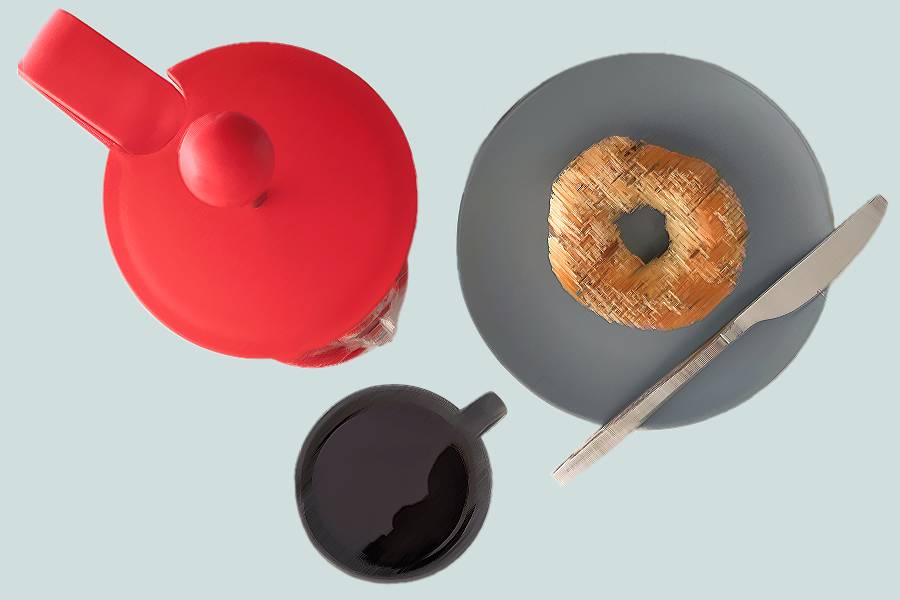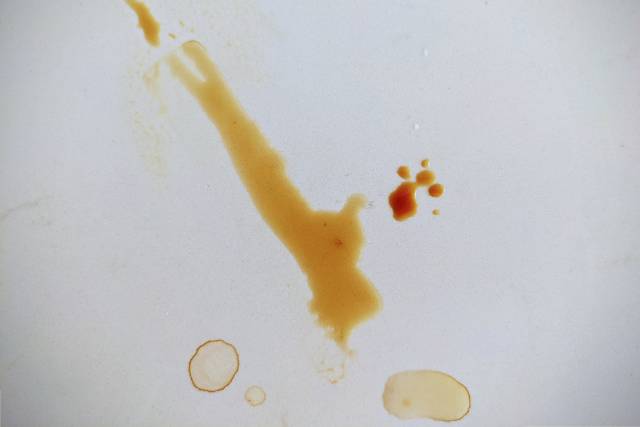We’re all guilty of relying on our morning cup of joe for that instant pep in our step. But there are times when it just doesn’t seem to work. It can even leave you feeling more tired. And you are left wondering why doesn’t caffeine wake me up?
There’s no easy answer; maybe you’re too tired for caffeine to work its magic. Maybe you’re chronically dehydrated and don’t know it. Whatever the reason, let’s dive deeper into the science behind caffeine consumption and its effect on our bodies.

Topics Explored
- How Does Caffeine Work?
- Caffeine Content in Popular Beverages
- Why Doesn’t it Work on Me? 5 Reasons
- Pros and Cons of Caffeine for your Health
- How Can I Reset My Caffeine Tolerance?
- FAQs
How Does Caffeine Work?
Adenosine is a molecule created naturally in your body after intense physical or mental work. It’s responsible for activating several receptors in the brain, including those responsible for muscle relaxation and sleepiness.
Caffeine is the guard that stops adenosine from binding with sleep receptors(1) and keeps you alert.
Caffeine also triggers the release of adrenaline, the chemical in your body responsible for fast response. That’s why caffeine is a good pre-workout and morning drink.
But too much caffeine in your system results in large amounts of adrenaline being released. It can raise your blood pressure, overstimulate the heart, and keep you away from thinking calmly and logically.
Caffeine Content in Popular Beverages

Leading an active lifestyle rushing from meeting to work to hangouts can have you going overboard with your caffeine intake. The recommended daily dose is 400 mg, equaling roughly 3 to 4 cups of coffee(2), and you shouldn’t exceed that.
Word of caution, it’s a rule of thumb; you might be more sensitive and need to stop on your second cup.
Here’s a handy chart with the caffeine content of different beverages so you can stay on track with your intake.
- Espresso: 64 mg per 1 oz (single shot)
- Black Coffee: 144 mg per 12 oz (regular or Starbucks tall)
- Black Tea: 70 mg per 12 oz (regular or Starbucks tall)
- Green Tea: 42 mg per 12 oz (regular or Starbucks tall)
- Cola: 33 mg per 12 oz (regular can)
Why Doesn’t Caffeine Wake Me Up: 5 Reasons
You’re not making this up; you can feel more tired and sluggish after your shot of espresso. Look around, everyone seems jazzed after their morning brew. Why doesn’t caffeine wake me up? Here are some science-backed answers to your burning question.

1. Genetics
Almost half of the population are fast metabolizers that don’t feel any effect from caffeine. Genetics are to blame – you might have inherited both your parents’ CYP1A2 gene(3) responsible for caffeine breakdown.
Hyposensitivity means caffeine doesn’t linger long in the metabolism, but the good parts like antioxidants, polyphenols stay. Hey, it’s not all bad!
2. Caffeine Tolerance
Caffeine tolerance is developed after steadily consuming a substantial dose of caffeine. It aids in creating more adenosine receptors in the brain. The more receptors, the larger the probability of adenosine triggering them.
Caffeine can’t guard all receptors against binding with adenosine, resulting in tiredness and decreased caffeine effect.
3. Sleep Deprivation
Caffeine doesn’t affect sharpness and attention when used by sleep-deprived people. That’s why you’ll find that after a while, coffee and energy drinks don’t help you pull all-nighters.
After several days with restricted sleep, caffeine no longer provides the desired effect; it can even make you anxious and tense.
4. Lifestyle Changes
If you’re controlling your caffeine intake, look closer at your chocolate, tea, soda, and even medication. Coffee is not the only source of caffeine!
Collectively, you might be consuming more caffeine than recommended.
Switching your coffee order, getting a different brew can also result in consuming twice as much caffeine per cup.
5. Dehydration
Caffeine is a known diuretic; think rushing to the bathroom every morning after your cup of joe.
Increased caffeine intake leads to more frequent bowel movements that can dehydrate your body and make you feel tired. Losing body fluids affects the normal function of all your organs, including blood pressure, causing exhaustion.
Pros and Cons of Caffeine for your Health
Your daily cup can make you feel more energized and alert. As an added bonus, you can reap about a dozen other health benefits.
Now, before you go to town, caffeine can also wreak havoc on your body if you go overboard so moderation is key.
Pros
- Great for heart health
- Helps with weight loss
- Increases mental alertness
- Lowers diabetes risk
Cons
- Worsens anxiety & depression
- Induces insomnia
Benefits of Caffeine
1. Heart Health
Consuming caffeine daily can reduce your risk of long-term heart failure(4). Just make sure it’s from healthy sources such as coffee or tea and not loaded with sugar or high-fat products.
2. Weight Loss
Caffeine on its own doesn’t make you lose weight. It does however speed up your metabolism. According to this study on obesity, consuming 300 mg of caffeine can burn up to 79 calories more daily.
This coffee variation is also known help with weight loss by keeping you satiated for longer.
3. Lowers Diabetes Risk
According to the European Journal of Nutrition, for every 200mg of daily caffeine intake, the risk of developing diabetes type 2 drops by 12 to 14%(5).
If you drink more caffeine, your risk is reduced further. This goes with saying that you should never exceed the daily recommended amount.
4. Mental Alertness
Caffeine blocks adenosine and stimulates dopamine and norepinephrine, leading to improved alertness and fast response.
A new study from the University of Toronto also demonstrates coffee’s effectiveness in decreasing your chances of brain diseases like Alzheimer’s and Parkinson’s.

Side Effects
1. Blood Pressure
Caffeine can cause a temporary increase in blood pressure in some people. It’s usually a slight increase of up to 3-4 mmHg(6) and disappears with frequent caffeine consumption.
2. Anxiety & Depression
Slow metabolism keeps caffeine longer in your body and can lead to severe anxiety and jitters. Caffeine can also interfere with some antidepressants, increasing their effects.
3. Insomnia
Caffeine is known to keep you alert and fight the adenosine from triggering the relaxing receptors. Overused or using caffeine to stay awake later in the day can lead to insomnia.
How Can I Reset My Caffeine Tolerance?
It takes about two weeks to reset your caffeine tolerance. You can choose to either go cold-turkey or slowly taper it off for a more extended period. Here are some facts to help you decide what strategy suits you.

The Slow & Steady
If you want to adjust slowly to a caffeine-free life, start by cutting your caffeine intake in half for the workweek.
On the weekend, cut that caffeine in half, and eventually, follow by a zero caffeine week. This method prevents getting kicked in the face by caffeine withdrawal symptoms.
The Cold Turkey
For the impatient folks, there’s the cold turkey method, cutting all caffeine for a week. There’s less to think about; you don’t have to remember if you had tea or coffee in the morning.
But it’s challenging and isn’t recommended due to the withdrawal symptoms.
Caffeine Withdrawal Symptoms
Caffeine withdrawal is recognized as a disorder. The worst symptoms happen 24 hours after cutting and can last 2 to 9 days.
- Severe headaches due to relaxed blood vessels which create pressure your brain;
- Lethargy, lower alertness and difficulty concentrating;
- Dysphoric mood including depression and irritability;
- Flu-like symptoms of nausea, vomiting and muscle pain or stiffness.
Final Thoughts

Caffeine is a stimulant intended to help you be more energized and alert, so when it doesn’t do its job, it makes sense to find out why. It can even be frustrating to no longer experience the benefits or, even worse, struggle with the side effects.
Still left wondering why doesn’t caffeine wake me up after this? Remember that our bodies are unique and general reasons may not apply. If you’ve health concerns, it doesn’t hurt to speak to your doctor about this.
FAQs
What can wake me up besides coffee?
Black tea is a natural source of caffeine that can serve as a coffee replacement. Energy drinks aren’t your best choice due to the high sugar content that causes an instant spike and crash in energy. Morning workouts, cold showers, or investing in wake-up lights can change your mornings and wellness for good.
Will decaf coffee wake me up?
It’s a common myth that decaf coffee contains no caffeine. It still contains trace amounts of 3 mg per 12 oz. Keep in mind that one regular coffee cup has 64 to 144 mg of caffeine, so you would have to drink many decafs to experience any effect.
Wondering where your info comes from? We totally understand. Hey Joe only obtains our information from reputable sources. Contents from this article are sourced from the following publications:
- McGill: https://thebrain.mcgill.ca/flash/i/i_03/i_03_m/i_03_m_par/i_03_m_par_cafeine.html
- Mayo Clinic: https://www.mayoclinic.org/healthy-lifestyle/nutrition-and-healthy-eating/in-depth/caffeine/art-20045678
- Oxford Academic: https://academic.oup.com/hmg/article/21/14/3283/2385718
- University of Colorado School of Medicine: https://www.webmd.com/heart-disease/heart-failure/news/20210209/daily-coffee-tied-to-lower-risk-for-heart-failure
- European Journal of Nutrition: https://link.springer.com/article/10.1007/s00394-013-0603-x
- National Library of Medicine: https://pubmed.ncbi.nlm.nih.gov/18094346/

